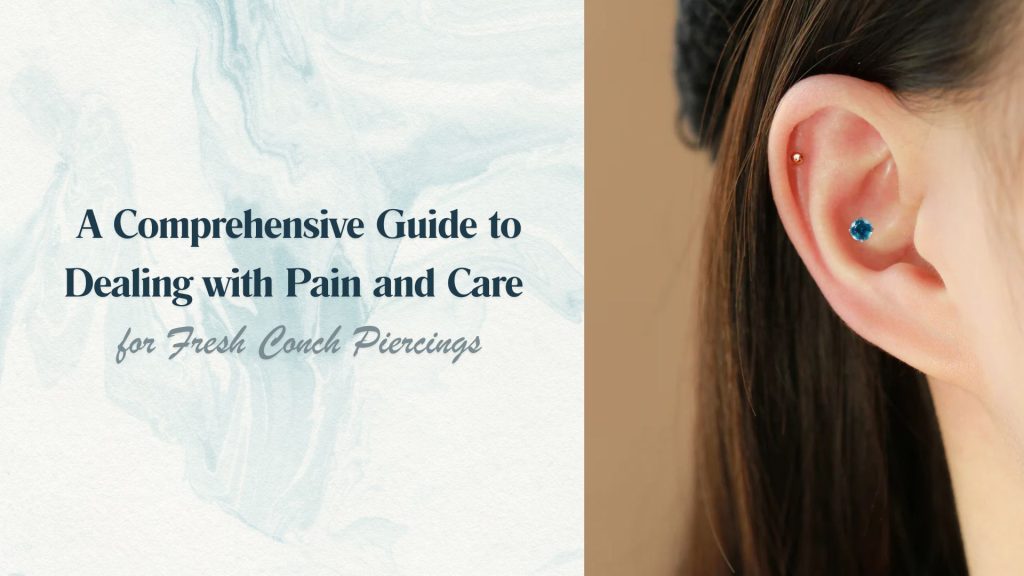
Ouch! Did your fresh conch piercing hurts? It’s normal to have some pain few days after your piercing. You might hear conch piercing hurts more and that is somewhat true because conch is the harder and thicker part of the ear.
Before going into details here are some things you can expect after getting your conch piercing done.
Pain & Discomfort:
It is the first and foremost thing you can expect. Conch piercings are not comfortable like other piercings this is due to thick and hard cartilage on that area. You need to keep this in mind that it is normal to experience throbbing pain and tightness that will go away on its own.
Healing time:
Many people expect that their conch piercing will heal within 2 to 3 weeks and when it does not happen they panic. It is important to know that conch piercing take at least 6 to 9 months to heal completely and sometimes even more. The healing time depends on the aftercare provided by your piercer.
Swelling:
You may experience swelling after getting your piercing done so keep calm. It is basically a natural response to trauma which lead to puffy red ears and will go away within few days.
Let’s look out the ways through which you can minimise the pain or discomfort
Understanding the Healing Process:
First and foremost, it’s essential to understand that fresh piercings, including conch piercings, require time to heal. During the initial stage, you may experience varying levels of discomfort, swelling, and sensitivity around the pierced area. However, with proper care and patience, these symptoms will gradually subside as the piercing heals.
Managing Pain and Discomfort:
- Utilise Ice Packs: Put a cold rag on your ear to cool it down and stop the throbbing. This can help reduce swelling and numb the pain temporarily and alleviate discomfort, especially during the first week post-piercing.
- Use Anti-Inflammatory Medication: Over-the-counter anti-inflammatory medication like ibuprofen can be beneficial in reducing pain and swelling associated with a fresh conch piercing. You can crush up an Advil tablet and mix it with water to create a paste. Apply this paste directly to your piercing to help soothe it. Advil contains ibuprofen that can help reduce swelling and pain. Always follow the recommended dosage instructions provided on the medication packaging.
- Avoid Touching or Rotating the Piercing: It’s crucial to resist the temptation to touch or rotate your piercing, as this can lead to further irritation and delay the healing process. Leave the piercing undisturbed and allow it to heal naturally.
- Adopt a Gentle Cleaning Routine: Your piercer may recommend clean the piercing three times a day. Mix a cup of warm water with a 1/4 teaspoon of sea salt. Stir until dissolved and apply it using a cotton. Other than that, be sure to keep your hands and fingers away from it.. Additionally, rinsing the piercing under hot water in the shower once a day can promote healing by encouraging blood circulation to the area.
- Keep the Piercing Dry and Exposed to Air: Avoid exposing the piercing to excessive moisture, and keep wet hair away from the pierced area. Allow any blood or crusties to naturally come off during your shower routine, and refrain from touching or disturbing the jewellery.
- Adopt Proper Sleeping Positions: Sleeping on piercing side can cause irritation and prolong to healing process. So it is important to avoid sleeping on your piercings to prevent unnecessary pressure and irritation. Consider using a travel pillow placed flat on your regular pillow to accommodate your ear while sleeping.
- Apply chamomile tea: take a chamomile tea bag and boiled it in water for 10 minutes. Take clean cotton pad and dab a clean cotton pad once it’s cooled, squeeze out the excess liquid and apply it to your piercing site for few minutes. Chamomile penetrates deeper in the skin and reduces inflammation. Moreover its antimicrobial properties helps in killing germs and soothes the skin.
Potential risk and complications:
Although complications are rare but there are several risks that are associated with conch piercing that includes pain, infection, rejection and scarring. Moreover you might come in contact with dermatitis that is caused by poor quality of jewellery material. It is advisable to contact your healthcare professional if you experience any of these complications. You can heal your conch beautifully by carefully taking care of your piercing with patience and care
Understanding what to expect and how to manage pain and discomfort effectively will make the journey more manageable. With patience, proper care, and adherence to aftercare instructions, your conch piercing can heal beautifully, allowing you to enjoy your new body art without complications. Embrace the process and look forward to showcasing your stunning conch piercing.